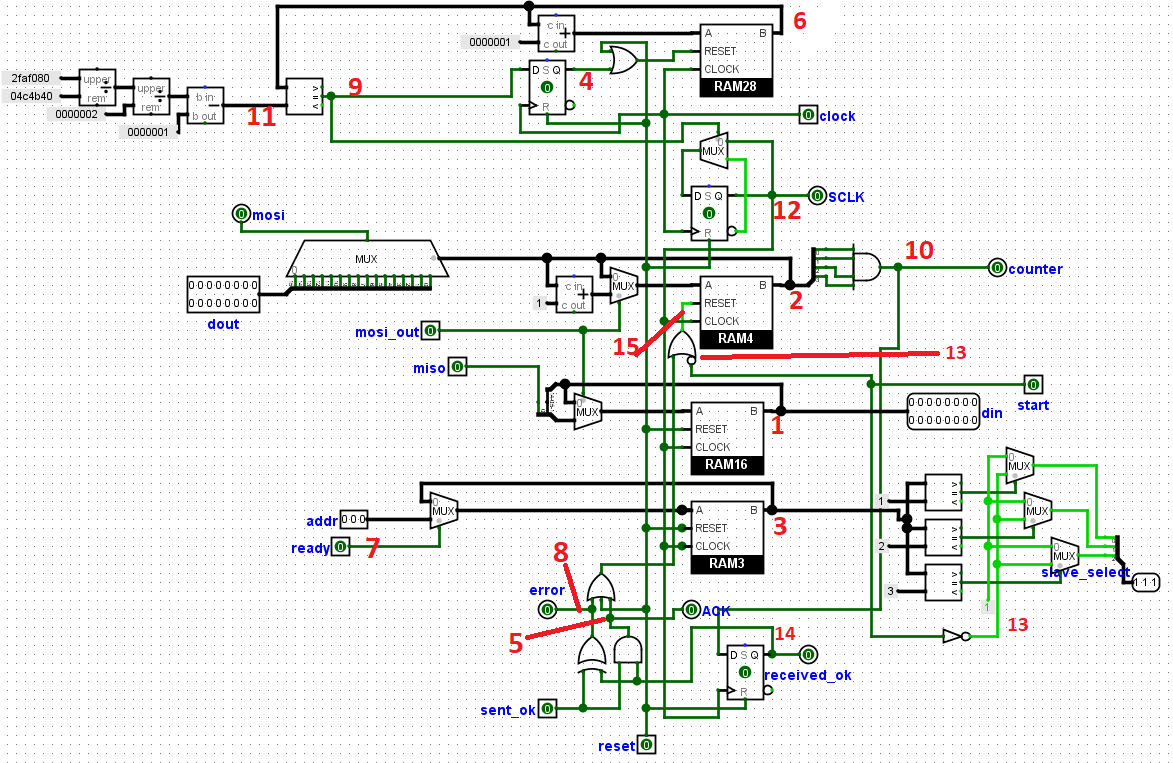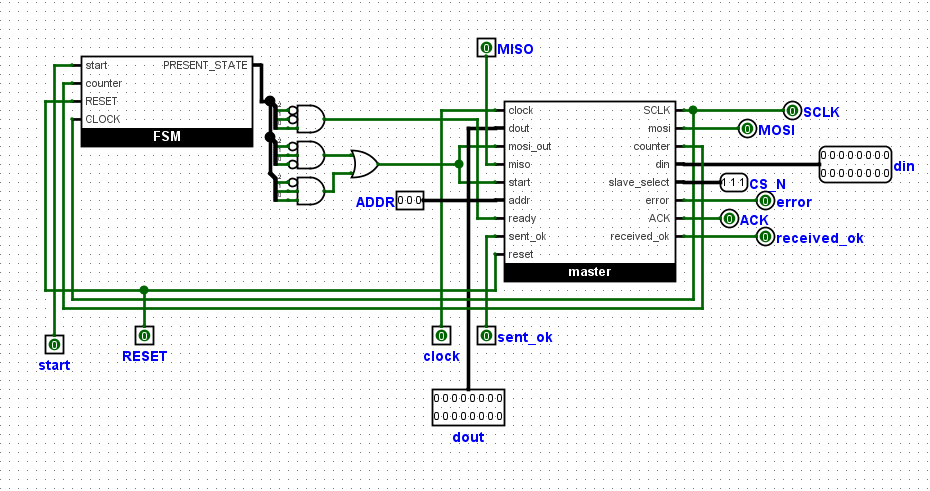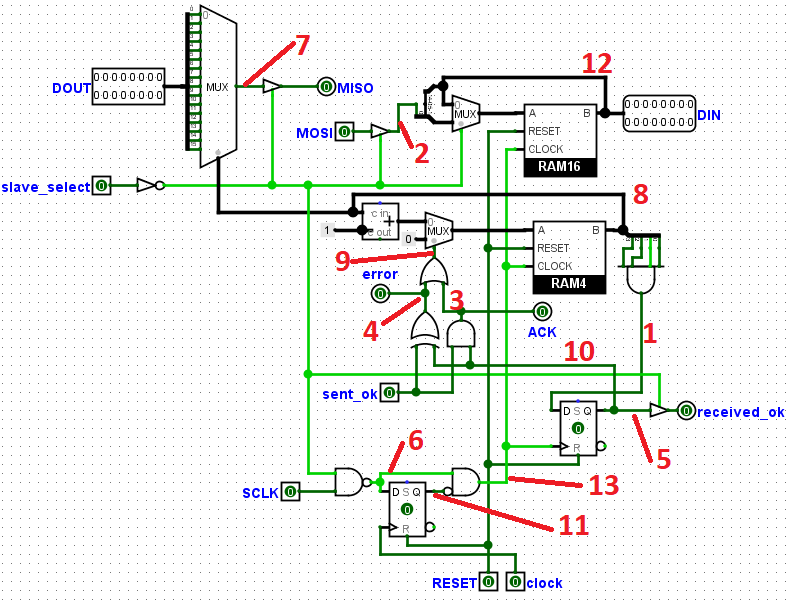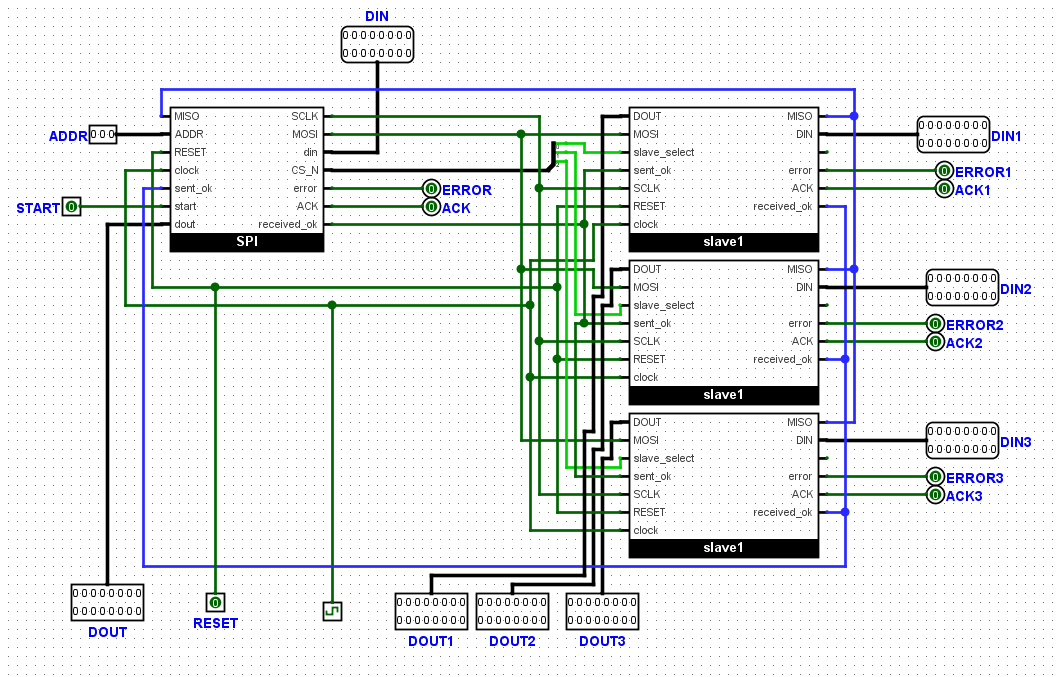The SPI master consist of two circuits the master state action and the master FSM which will connected together below .




-------------------------------------------------------------------------------- -- PROJECTFPGA.COM -------------------------------------------------------------------------------- -- NAME: master_spi -------------------------------------------------------------------------------- -- AUTHORS: Ezeuko Emmanuel <ezeuko.arinze@projectfpga.com> -------------------------------------------------------------------------------- -- WEBSITE: https://projectfpga.com/spi -------------------------------------------------------------------------------- -------------------------------------------------------------------------------- -- SPI MASTER AND SLAVE FOR FPGA -------------------------------------------------------------------------------- -- Copyright (C) 2020 projectfpga.com -- -- This source file is free software: you can redistribute it and/or modify -- it under the terms of the GNU Lesser General Public License as published by -- the Free Software Foundation, either version 3 of the License, or -- (at your option) any later version. -- -- This source file is distributed in the hope that it will be useful, -- but WITHOUT ANY WARRANTY; without even the implied warranty of -- MERCHANTABILITY or FITNESS FOR A PARTICULAR PURPOSE. See the -- GNU Lesser General Public License for more details. -- -- You should have received a copy of the GNU Lesser General Public License -- along with this program. If not, see <http://www.gnu.org/licenses/>. -------------------------------------------------------------------------------- library IEEE; use IEEE.STD_LOGIC_1164.ALL; use IEEE.NUMERIC_STD.ALL; use IEEE.MATH_REAL.ALL; -------------------------------------------------------------------------------- --****************************************************************************** --* This code implements the SPI master protocol * --* The code uses 3 spi_slaves, you can adjust to any number * --* The spi_slave is in a different VHDL file * * --****************************************************************************** -------------------------------------------------------------------------------- entity master_spi is Generic ( CLK_FREQ : natural := 50e6; -- set system clock frequency in Hz SCLK_FREQ : natural := 5e6; -- set SPI clock frequency in Hz (condition: SCLK_FREQ <= CLK_FREQ/10) SLAVES : natural := 3 -- count of SPI slaves ); Port ( CLK : in std_logic; -- system clock RST : in std_logic; -- high active synchronous reset -- SPI MASTER INTERFACE SCLK : out std_logic; -- SPI clock slave_select : out std_logic_vector(SLAVES-1 downto 0); -- SPI chip select, active in low MOSI : out std_logic; -- SPI serial data from master to slave MISO : in std_logic; -- SPI serial data from slave to master -- INPUT USER INTERFACE ADDR : in std_logic_vector(SLAVES-1 downto 0); -- SPI slave address DOUT : in std_logic_vector(15 downto 0); -- input data for SPI slave received_ok : out std_logic; -- master acknowledge received data sent_ok : in std_logic; -- slaves acknowledges received data START : in std_logic; -- marks the beginning os sending data ACK : out std_logic; -- all is ok error : out std_logic; -- when error=1, sent_ok and received_ok are not the same -- OUTPUT USER INTERFACE DIN : out std_logic_vector(15 downto 0)-- output data from SPI slave ); end master_spi; architecture rtl of master_spi is signal s_ram16 : std_logic_vector(15 downto 0); signal s_ram4 : unsigned(3 downto 0); signal s_ram3 : std_logic_vector(2 downto 0); signal s_ram1_1 : std_logic; signal s_ACK : std_logic; signal s_ram28 : unsigned(WIDTH_CLK_CNT-1 downto 0); signal s_ready : std_logic; signal s_error : std_logic; signal ticker : std_logic; signal counter : std_logic; constant DIVIDER_VALUE : integer := (CLK_FREQ/SCLK_FREQ)/2; signal s_sclk : std_logic; signal s_sel : std_logic; signal s_received_ok : std_logic; signal reset_ram4 : std_logic; --spi master FSM type stages is (stage0, stage1, stage2, stage3, stage4); signal stage : stages; begin ticker <= '1' when (s_ram28 = DIVIDER_VALUE-1) else '0'; counter <= '1' when (s_ram4 = "1111") else '0'; mosi <= DOUT(to_integer(unsigned(s_ram4))); SCLK <= s_sclk; DIN <=s_ram16; s_error <= sent_ok xor s_received_ok; error <= s_error; s_ACK <= sent_ok and s_received_ok; ACK <=s_ACK; received_ok <= s_received_ok; reset_ram4 <= s_error or s_ACK or RST or s_sel; sclk_counter : process (RST, CLK) begin if RST='1' then s_ram28 <=(others => '0'); s_ram1_1 <='0'; s_sclk <='0'; elsif rising_edge(CLK) then if (ticker = '1') then s_ram28 <=(others => '0'); s_sclk <=not s_sclk; else s_sclk <= s_sclk; s_ram28 <= s_ram28 + 1; end if; end if; end process sclk_counter; states: process (RST, S_SCLK) begin if reset_ram4='1' then s_ram4 <=(others => '0'); elsif RST='1' then stage <=stage1; s_ram16 <=(others => '0'); s_ram3 <=(others => '0'); s_ram1_1 <='0'; s_received_ok <='0'; elsif rising_edge(S_SCLK) then s_received_ok <=counter ; case stage is when stage0 => if (start = '1') then stage <= stage1; else stage <= stage0; end if; when stage1 => s_ready <='1'; s_ram3 <=ADDR; stage <= stage2; when stage2 => s_ram4 <= s_ram4 + 1; s_ram16 <= s_ram16(14 downto 0) & MISO; s_sel <= '0'; if (counter = '1') then stage <= stage4; else stage <= stage3; end if; when stage3 => s_ram4 <= s_ram4 + 1; s_ram16 <= s_ram16(14 downto 0) & MISO; s_sel <= '0'; if (counter = '1') then stage <= stage4; else stage <= stage2; end if; when stage4 => if (s_ACK= '1') then stage <= stage0; else stage <= stage4; end if; when others => stage <= stage0; end case; end if; end process; cs_n_g : for i in 1 to SLAVES generate cs_n_p : process (s_sel, s_ram3) begin if (to_integer(unsigned(s_ram3)) = i) then slave_select(i-1) <= s_sel; else slave_select(i-1) <= '1'; end if; end process; end generate; end rtl;


-------------------------------------------------------------------------------- -- PROJECTFPGA.COM -------------------------------------------------------------------------------- -- NAME: spi slave -------------------------------------------------------------------------------- -- AUTHORS: Ezeuko Emmanuel <ezeuko.arinze@projectfpga.com> -------------------------------------------------------------------------------- -- WEBSITE: https://projectfpga.com/spi -------------------------------------------------------------------------------- -------------------------------------------------------------------------------- -- SPI MASTER AND SLAVE FOR FPGA -------------------------------------------------------------------------------- -- Copyright (C) 2020 projectfpga.com -- -- This source file is free software: you can redistribute it and/or modify -- it under the terms of the GNU Lesser General Public License as published by -- the Free Software Foundation, either version 3 of the License, or -- (at your option) any later version. -- -- This source file is distributed in the hope that it will be useful, -- but WITHOUT ANY WARRANTY; without even the implied warranty of -- MERCHANTABILITY or FITNESS FOR A PARTICULAR PURPOSE. See the -- GNU Lesser General Public License for more details. -- -- You should have received a copy of the GNU Lesser General Public License -- along with this program. If not, see <http://www.gnu.org/licenses/>. -------------------------------------------------------------------------------- library IEEE; use IEEE.STD_LOGIC_1164.ALL; use IEEE.NUMERIC_STD.ALL; -- THE SPI SLAVE MODULE SUPPORT ONLY SPI MODE 0 (CPOL=0, CPHA=0)!!! entity slave_spi is Port ( CLK : in std_logic; -- system clock RST : in std_logic; -- high active synchronous reset -- SPI SLAVE INTERFACE SCLK : in std_logic; -- SPI clock slave_select : in std_logic; -- SPI chip select, active in low MOSI : in std_logic; -- SPI serial data from master to slave MISO : out std_logic; -- SPI serial data from slave to master -- USER INTERFACE DOUT : in std_logic_vector(15 downto 0); -- input data from SPI slave DIN : out std_logic_vector(15 downto 0); -- output data from SPI master TO SLAVE received_ok : out std_logic; -- master acknowledge received data sent_ok : in std_logic; -- slaves acknowledges received data ACK : out std_logic; -- all is ok error : out std_logic -- when error=1, sent_ok and received_ok are not the same ); end slave_spi; architecture RTL of slave_spi is signal counter : std_logic; signal mosi_in : std_logic; signal s_ACK : std_logic; signal s_error : std_logic; signal s_received_ok : std_logic; signal s_ram1_2_data : std_logic; signal s_out : std_logic; signal s_ram4 : unsigned(3 downto 0); signal reset_ram4 : std_logic; signal s_ram1_1 : std_logic; signal s_ram1_2 : std_logic; signal s_ram16 : std_logic_vector(15 downto 0); signal s_SCLK : std_logic; begin counter <= '1' when (s_ram4 = "1111") else '0'; s_ram1_2_data <= SCLK nand not slave_select; s_SCLK <= not s_ram1_2_data and s_ram1_2; s_out <= DOUT(to_integer(unsigned(s_ram4))); DIN <= s_ram16; s_error <= sent_ok xor s_received_ok; error <= s_error; s_ACK <= sent_ok and s_received_ok; ACK <=s_ACK; reset_ram4 <= s_error or s_ACK; tri_state_buffer : process (slave_select) begin if (slave_select = '1') then mosi_in <= 'Z'; MISO <= 'Z'; received_ok <= 'Z'; else MISO <=s_out; mosi_in <= MOSI; received_ok <= s_received_ok; end if; end process tri_state_buffer; clocking: process (RST, CLK) begin if (RST = '1') then s_ram1_2 <= '0'; elsif (rising_edge(CLK)) then s_ram1_2 <= s_ram1_2_data; end if; end process clocking; spi: process (RST, s_SCLK) begin if (RST = '1') then s_ram16 <=(others => '0'); s_ram4 <=(others => '0'); s_ram1_1 <= '0'; elsif (rising_edge(s_SCLK)) then s_received_ok <= counter; if(slave_select = '1') then s_ram16 <= s_ram16(14 downto 0) & MOSI; end if; if( reset_ram4 = '1' ) then s_ram4 <=(others => '0'); else s_ram4 <= s_ram4 +1; end if; end if; end process spi; end rtl;
